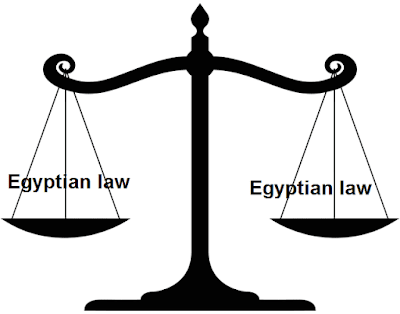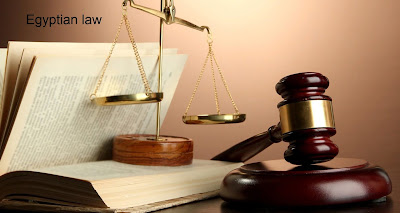The source of law
Legal and historical sources
Sources of law can be classified as either legal or historicalthe former are those resources which are recognised as such by the law itself the latter are those sources lacking recognition by the law
For every legal system contains rules determining the establishment of new law and the disappearance of old
. Legal sources of Egyptian law
according to the Egyptian civil code the legal sources of law or legislation muslim law and the natural law
1. Legislation
Legislation or statute law consisted of acts of Parliament end of law passed by the government ,in another Words, legislation is the lying down of legal rules by a sovereiegn or subordinate legislators
Legislation his eyes are so or subordinate at the summit of hierarchy are the constitution or constitutional laws native authority in Egypt is house of people
Subordinate legislation
Enactments of legislative bodies inferior to the sovereign constitute subordinate legislation. such legislation is subordinate in it that can be rebuilt boy and must give way to sovereign legislation.
The chief form of subordinate legislation is the executive.
The Essential functions of the executive is to conduct the administrative departments of the state but it combines with his certain subordinate legislative powers which have been expressly delegated to it by Parliament
The main merits of legislation
Of written form: Being written is acquires clarity and stability and could be reviewed when necessary unlike Customs which is sometimes difficult to recognise.
Adaptable when necessary as it could be easily promulgated and can be called as need arises.
Uniformity as rules of law are of general nature applicable everywhere within the territory of the State
. Various types of legislation
Legislations are 3 types
1. Principle legislation represented in the state constitution
2. Ordinary legislation represented in the various codes covering all sides of human activities like civil code , commercial code ,the criminal code and the like
3. Supplementary legislation:
sprining out of executive authority for the purpose of giving force to the ordinary legislation . It takes three forms, executive regulations, through which laws can be applied, disciplinary regulation that decided the form and liabilities of society institutions and how to practice their activities
3. Control regulations like those related with keeping security, regulating traffic and health care
. promulgation of legislation
In Egypt the premulegation of law is the duty of the People's Assembly through a number of processes as follows:
1. Suggestion
Law can be suggested by any of the People's Assembly members or the president of the Republic "article 19" of the constitution
. Discussion and voting
If a law project is presented before the parliament it is sent to the committee concerned where it is first to reviewed then a report is made about that could be the core for discussion.
After the discussion, members are invited to gives their say about the article if more than half the members say yes to the law it is sent to the president to promulgate and publish, but if all photos are all the same number as those who reject it it is considered rejected
President approval
Is the president in the process of promulgating legislation is authorised to disagree even when the People's Assembly for tn20 in case of opposition the president is expected to return the object to the Parliament within 30 days if not yellow is considered approved and should be promulgated.
The law is also promulgated even if returning to the People's Assembly in time but approved for the second time by 2/3 of the members and the president is such case loses his rights of opposition
. Presidents liability to make law
According to article 147 and 108 observer constitution the president of republic has the power to promulgated laws in three cases
a. If need arises
b. Is delegated
c. If the assembly is dissolved
. Enforcement of legislation
law rules Can not the forced after being promulgated by the head of the state vibro irrigation resident of the Republic give order to all official and the government institutions to apply the law and they give it force. Lindsay Lou need to be published in the formal state magazine within 2 weeks of promulgation. Publishing law is main cause hooligan Vienna of a brake to know if it's promulgation why to acquire the knowledge it is natural to the side and a client for the start of application but if the law is void of such limit, become enforceable a month after promulgation utd in emergency cases such time limit is disregarded.
If the law is communicated by the executive shortly and published and the deadline for application has elected nobody can argue that he is still ignorant of the law unless this is a case of force majeur such as Wars floods all earthquakes
.. Custom
although, a custom is an important source of law in early times it's importance continuously diminishes as the legal system grows
However customs plays a preponderanant role in all legal systems and in developing or applying the law. Legislation itself in order to be understood often has to appeal to custom for the necessary clarification what was the ideas of the legislators the custom is the popular source of law.
When a person has been doing a thing regularly over a substantial period of time it is usual to say that who is accustomed to doing it,
When a large section of the popular are in habit of doing a thing over very much longer period it becomes necessary for then courts to consider it. The third source of law is Muslim legislation the last two sources of natural law and the law of equity
Natural law and equity
In case where the legislation is silent, sufficient or obscure the judge applying the principles of natural law and rules of equity
Natural law and equity is an Indian law which can be known by his own just which Justice, good faith, and good conscience require in a certain case















